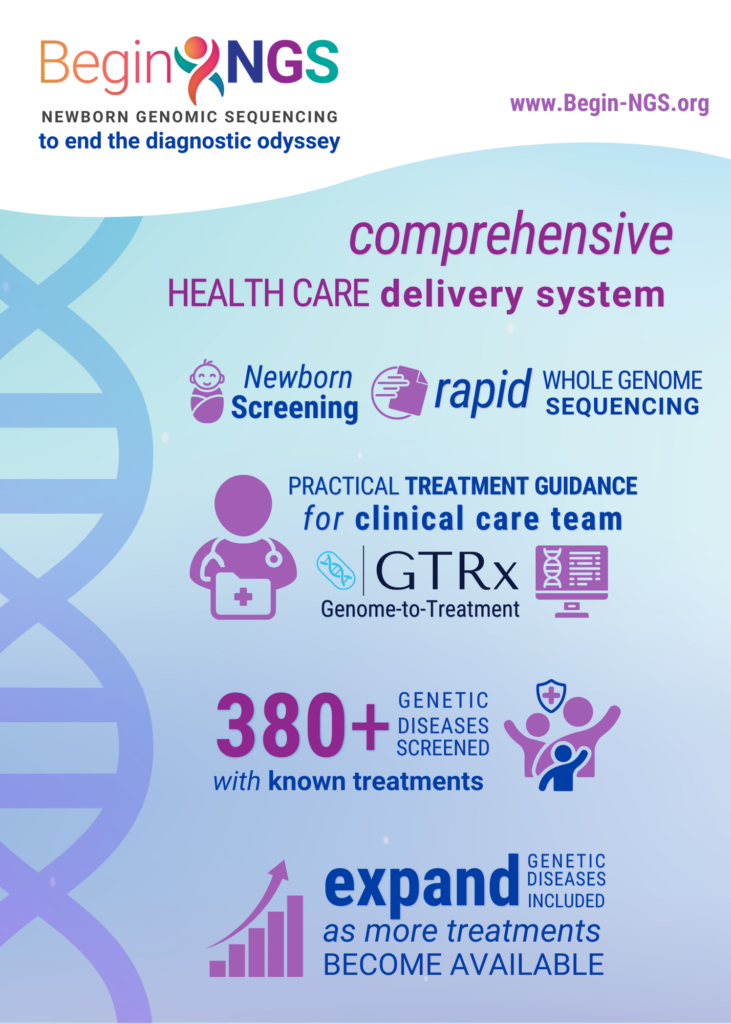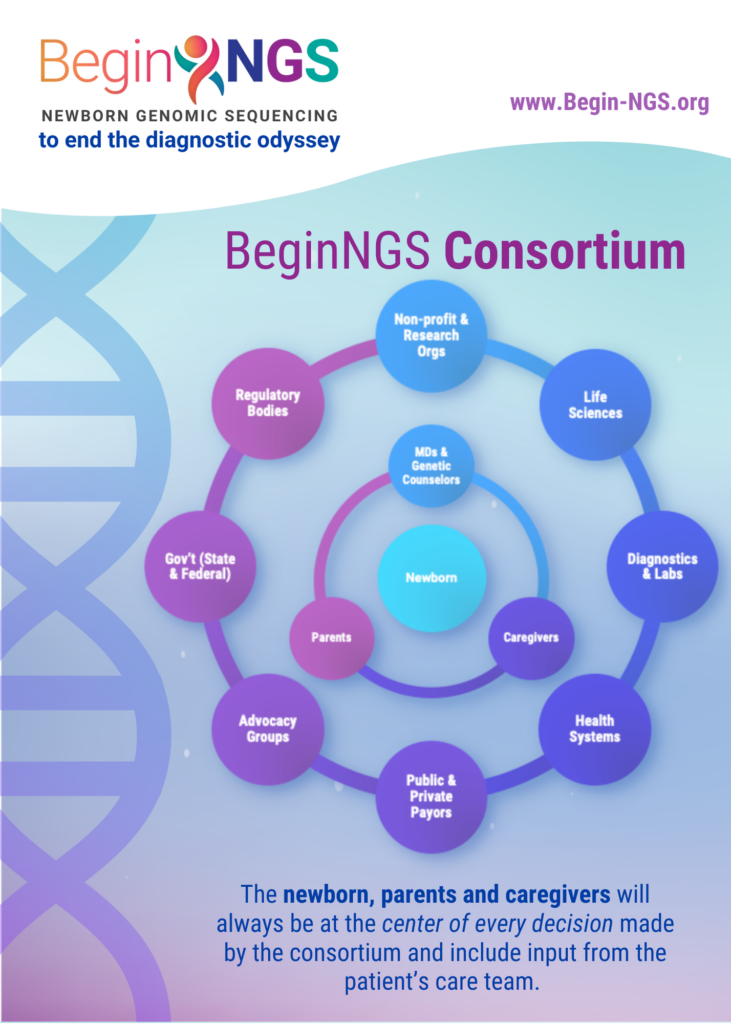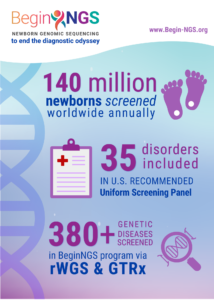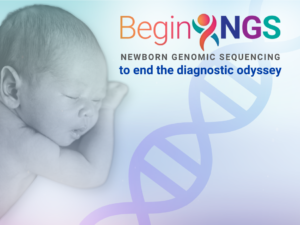BeginNGS™ to accelerate newborn screening by rapid whole genome sequencing to help diagnose and treat genetic diseases with available therapies
 Rady Children’s Institute for Genomic Medicine (RCIGM®) today announced a novel program to advance and evaluate scalability of a diagnostic and precision medicine guidance tool called BeginNGS™ (pronounced “beginnings”) to screen newborns for approximately 400 genetic diseases that have known treatment options using rapid Whole Genome Sequencing (rWGS®). BeginNGS, developed through a research collaboration with Alexion, AstraZeneca’s Rare Disease group; Fabric Genomics; Genomenon; Illumina, Inc.; and TileDB, uses rWGS to diagnose and identify treatment options for genetic conditions before symptoms begin, an advancement over current pediatric uses of rWGS that focus mainly on children who are already critically ill. Once a diagnosis is made, BeginNGS uses Genome-to-Treatment (GTRx™), a tool that provides immediate treatment guidelines for physicians to help them understand genetic conditions and their available treatment options, which may include therapeutics, dietary changes, surgery, medical devices or other interventions.
Rady Children’s Institute for Genomic Medicine (RCIGM®) today announced a novel program to advance and evaluate scalability of a diagnostic and precision medicine guidance tool called BeginNGS™ (pronounced “beginnings”) to screen newborns for approximately 400 genetic diseases that have known treatment options using rapid Whole Genome Sequencing (rWGS®). BeginNGS, developed through a research collaboration with Alexion, AstraZeneca’s Rare Disease group; Fabric Genomics; Genomenon; Illumina, Inc.; and TileDB, uses rWGS to diagnose and identify treatment options for genetic conditions before symptoms begin, an advancement over current pediatric uses of rWGS that focus mainly on children who are already critically ill. Once a diagnosis is made, BeginNGS uses Genome-to-Treatment (GTRx™), a tool that provides immediate treatment guidelines for physicians to help them understand genetic conditions and their available treatment options, which may include therapeutics, dietary changes, surgery, medical devices or other interventions.
“RCIGM helped pioneer the use of rWGS for diagnosis of genetic disease in intensive care settings,” said Stephen Kingsmore, MD, DSc, President & CEO of RCIGM. “With the clinical utility of diagnostic rWGS proven, we are using that experience to screen, diagnose, and help treat genetic conditions at or before onset of symptoms. Through a public-private consortium of leading organizations and advocacy groups in pediatrics, genetics, biopharma, biotech, and information technology we aim to scale newborn sequencing to every life-threatening childhood genetic disease that has an effective treatment.”
About the Initial Study to Advance BeginNGS
RCIGM is currently in the beginning stages of a pilot evaluation, which includes optimizing automated genomic sequencing and analysis, with the goal of curating a high-quality set of variants to enable testing for approximately 400 genetic disorders. In subsequent stages, study enrollment will begin, followed by system optimization and testing expansion to ~500 disorders and several thousand cases. The ultimate goal is for BeginNGS to become the genetic disease screening standard, with testing expanding to ~1,000 disorders and sequencing of 3.7 million newborns annually.
BeginNGS aims to supplement existing newborn screening protocols at birthing hospitals throughout the United States. Blood-spot samples will be collected at the time of birth and sent to a lab where rWGS, genomic analysis and interpretation will be performed for approximately 400 early onset and actionable genetic conditions. When a positive screening result is detected, a confirmatory diagnostic interpretation will be completed before a result is returned to the ordering physician. Additionally, physicians will be provided with guidance on known medical management options through GTRx, including all available treatments.
Establishing a Leading Public-Private BeginNGS Consortium
Established leaders in the genomics and biotech space, including Founding Members Alexion, Travere Therapeutics, and Inozyme Pharma will play a critical role to help advance this program towards a potential paradigm shift in newborn screening for treatable rare genetic diseases. The BeginNGS consortium will include representation from patient advocacy groups and the biomedical ecosystem, who will collectively provide strategic and technical expertise.
“Alexion is proud to be a founding member of the RCIGM BeginNGS Consortium to help accelerate newborn screening by whole genome sequencing,” said Tom Defay, Alexion’s Deputy Head, Diagnostics Strategy and Development. “We look forward to continuing our support and providing strategic leadership and technical expertise to advance this technology with the hope of transforming the diagnostic odyssey for patients with genetically-based rare diseases.”

“Expanding rWGS to newborn screening is important work with the potential to end agonizing years-long diagnostic odysseys while yielding critical data on the true prevalence of rare disorders,” said Charlene Son Rigby, CEO of RARE-X, a collaborative platform for global data sharing and analysis to accelerate treatments for rare disease. “Early diagnosis of rare disease patients will also open the door to ongoing monitoring of symptoms and gathering of critical natural history data.”
“Most neurodevelopmental disorders are not included on the current newborn screening tests and these children face a life of disability and even death if they are not diagnosed early enough,” said Dr. Terry Jo Bichell, Executive Director of COMBINEDBrain, a consortium devoted to speeding the path to clinical treatments for people with severe rare genetic non-verbal neurodevelopmental disorders. “This project will be life-saving for rare genetic neurodevelopmental disorders and will demonstrate that newborn genetic testing saves lives.”
The National Hemophilia Foundation and the Indiana Hemophilia and Thrombosis Center are helping provide input on bleeding and clotting disorders to be included in the BeginNGS screening panel and to provide guidance about treatments, causative mutations and samples for testing.
Addressing the Need for Enhanced Newborn Screening Tools

“With hundreds of new gene therapies and orphan drugs in development, RCIGM believes now is the time to end the diagnostic and therapeutic odyssey for all children with treatable genetic diseases,” said Dr. Kingsmore.

